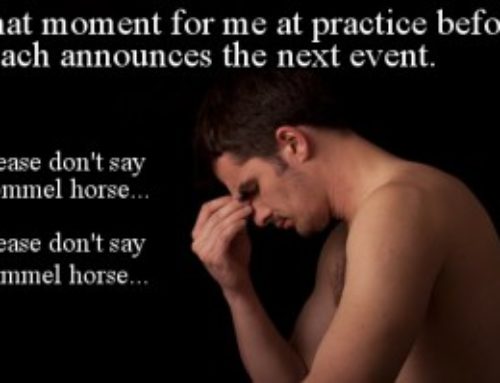After many tireless months of practice, strength training and routine after routine, it’s time to get up on the big stage and and see what you’re made of. It’s meet season and everyone is making the final preparations to ensure they are able to put up their best performance each weekend.
At this point, you’ve done the hard part. You’ve experienced the usual rips, shin splints, falls, face plants, blood, sweat, tears etc. You’ve suffered through thousands of lunges, frog jumps, v-ups, hollow holds, back lifts, handstand push-ups and pull ups. Most likely, your body is ready for competition. Or is it?
There is still one key thing to consider on competition day. What in the world should you eat? There is always some debate over the answer to this question because it really plays a significant role in how you perform. You could really mess up your day if you make a few poor decisions.
I’m not a nutritionist so I’m going to keep it simple and stick to some basic common sense on the topic. There are some simple things to keep in mind and some definite mistakes to avoid. I can certainly speak from experience of the many do’s and don’ts when it comes to competition day. The blunders are always fun to hear so I will start off with a few of my not so bright moments.
Mistake #1: Not eating at all before the competion
Some athletes avoid eating completely on competition day because they are terrified it may give them stomach issues during the meet. Bad idea. I’ve actually done this before and it basically destroyed any chance I had at winning.
I was competing in my first triathlon and I was super nervous like I always was for any big competition. I had trained extremely hard for it and I expected to do pretty well. The race was scheduled for early in the morning so there wasn’t much time to sit and let the nerves marinate. Like most young guys, I valued my sleep so I set my alarm to allow only enough time to throw on my gear and get to the race. No time for food. I had that nervous feeling in my stomach so I didn’t want to make time for food anyway. Huge mistake! What was I thinking? I was participating in an endurance competition and didn’t provide my body with any fuel like it was used to getting! Needless to say, I put up a very average performance. My swim was sluggish, my run was the slowest time I had put up in 6 months and my legs felt like jell-o on my bike. I honestly felt like I hadn’t trained at all because of my lack of stamina and energy level. My body was not accustomed to this because during training I was eating massive amounts of food to keep up with the calories I was burning. Suddenly changing my routine did not work well for my body.
Why freak out about eating food on competition day if you haven’t avoided it during your training?
Mistake # 2: Introducing a new food on competition day
Lucky for you, I’ve made all the mistakes for you so you can learn from them. Yes, I’ve done this one too.
I had another morning race that began around 11am. Of course, I learned my lesson last race so I planned on grabbing some food a few hours before it started. Still, I didn’t really plan well, so I was just going to grab whatever was available on the way to the race. I stopped at a grocery store, found the section with the huge variety of protein bars and just grabbed what looked good. You can probably see where this is heading. I ate the bar on the car ride to the race, smiling because I thought I’d just solidified my victory with the added fuel. Before I crumpled up the wrapper, I decided to look at the nutritional facts to see what I had just devoured. Yes, I looked after I ate the bar. Smart, I know. Everything is looking ok, then I get down to the fiber. Oh no! I could hear that familiar music from a scene in a horror movie in my head. 12 grams of fiber! Long story short, I had some stomach problems that day. The good news is, a few hours later, I set a new personal record sprinting to the bathroom.
Competition day is not the day to be trying new foods. Stick with what you know your stomach can handle. This leads me to the following question and point:
What exactly do I eat on competition day?
You can spend all day searching the internet, looking at the many different ideas of the exact foods to put in your body and the exact timing to do it. One person will say eat this and the next will tell you not to eat that. I promise you it will leave your head spinning. My advice is keep it simple and use some common sense.
Here is my simple advice on eating the day of the competition: Find out what works for you in the months leading up to competition season and stick to it.
If you think about it, going to a meet and performing 4 or 6 routines is far easier than what you experience in a normal practice. Practice is grueling with hours of hard core training while the meet is about 10 solid minutes of work. My point is, if you are training properly (in any sport), competition day is no more challenging than a day at practice. So there is no sense in making any drastic changes in your diet that day.
Instead of determining what to eat on the day of competition, focus more on figuring this out during your training. Practice eating and training and see what seems to work well for your body and energy. If your eating routine has you feeling great and energetic during practice, then most likely it’s going to work for you the day of the meet where you are doing way less work. We put so much emphasis on competition day that we feel we met do something differently.
There is no sense in over thinking it. Trying to mix up some magic recipe that you think is going to give you superman powers is just silly. Meet day is not the time to be experimenting or reading up on the “Best Foods for Energy on Competition Day.” Stick with what has been working for YOU.
I’ve never understood how one person can be so specific in recommending something to everyone and say this is what will work for all of you. What works for you may not work for your friend. The point is, everyone is different so you need to do your part leading up to competition in determining what puts you at your best so you don’t have to even think about it the day of the meet. You can treat it like it’s just another day and eat what you normally eat.
It seems simple because it is. My thoughts on performing well are repetition, routine and forming solid healthy habits. Those daily habits that you have devoted yourself to in the many months of training should stay consistent on the day you compete as well. Your best bet is to avoid the surprises and continue to do what has gotten you to this point. This will help ease your stress a little on the big day and allow you to simply trust the structured training you’ve done. Good luck and have fun!
Brad Thornton
Strength & Fitness Team Lead
www.GymnasticsStrength.com




Leave A Comment